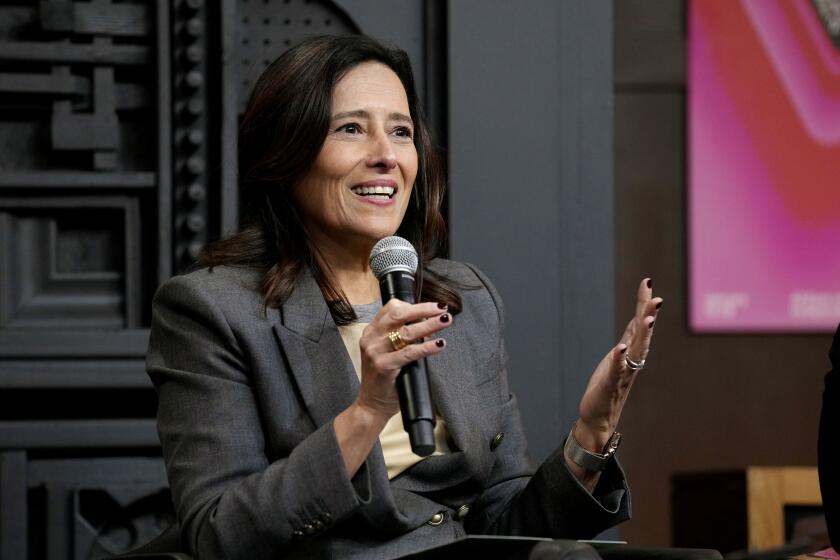From ‘The Glorias’ to ‘Promising Young Woman,’ movies by and about women take the spotlight at Sundance
- Share via
PARK CITY, Utah — Carey Mulligan has given some of her best performances as women who refuse, sometimes quietly and sometimes not, to accept the circumstances that life has dealt them. We met some of those characters for the first time here at the Sundance Film Festival: Think of her as the restless London student rejecting conservatism and embracing her curiosity about the world in “An Education” (2009), or the Montana woman openly revolting against her feckless husband in “Wildlife” (2018).
Both those pictures were set in the 1960s, and in both of them Mulligan came off as a thoroughly modern creature born before her time, shrewdly taking stock of her situation and weighing the possibilities of an escape. Her attention-grabbing new movie, “Promising Young Woman,” which premiered here this week, is an altogether different beast: an incisively plotted, tonally mischievous revenge thriller set in the present day. But on closer examination, it may be less of a departure from those earlier pictures than a progression.
Written and directed by Emerald Fennell, a former “Killing Eve” showrunner making a confident feature debut, the movie stars Mulligan as a small-town barista named Cassie, who is introduced nearly passed out drunk in a bar while three snickering men circle her like sharks. She goes home with one of them, who begins to have his way with her, only to realize with a jolt that she isn’t as helplessly inebriated as he had thought and hoped. A vision of rape culture at its casual, everyday worst quickly spirals into a pleasurably unsettling cautionary tale and a turning-the-tables fantasy that is all the more effective for its visual restraint.
Cassie is an avenging dark angel, a predator’s predator on a one-woman campaign to make the post-#MeToo world a safer place for women. There is more to come, including a charming love interest (a superbly cast Bo Burnham), a Paris Hilton singalong, several delicious reckonings and a grim backstory that reveals the traumas that made Cassie who she is and will continue to shape who she becomes. Fennell plays cleverly with our expectations, sometimes with bright pastel colors and disconcerting grace notes of lightness and humor.
The tonal swings can be jarring, but they’re also in keeping with the movie’s subject: the vicious sexual aggression that can lurk just beneath the surface of even the most polite encounters. And Mulligan’s subtly shape-shifting performance lends the movie a coherence that it may not have had otherwise. “Promising Young Woman,” which will open in theaters April 17 through Focus Features, is a smarter, more complicated and bruising picture than the flashy vigilante fantasy it suggested on paper. It reminds us that revenge may be fun but justice is elusive, and that rage can be both empowering and self-destructive.
But rage can also be constructive, a lesson that is on conventional but rousing display in “The Glorias,” Julie Taymor’s sweeping, prismatic portrait of Gloria Steinem. This may not be the best of the many female-directed, female-centered movies at Sundance this year, but it certainly feels like the most lavishly emblematic. A globe-trotting, decades-spanning whirlwind of a movie, it casts four actresses — Ryan Kiera Armstrong, Lulu Wilson, Alicia Vikander and Julianne Moore — to play the second-wave feminist writer, speaker and activist at different stages of her life. The various episodes are framed by an imaginary black-and-white road trip, with the multiple Glorias traveling on a bus, having vigorous but loving arguments with one another that illuminate Steinem’s own jagged lifelong evolution.
We see her as a girl and a teenager, whose parents (Enid Graham and Timothy Hutton) bequeath her a difficult childhood but also encouragement, confidence and a desire to go against the grain. We see her distinguishing herself as a journalist, despite the leering condescension of her male colleagues, before going on to co-found the liberal feminist magazine Ms. We see her traveling in India and witnessing the grievous oppression of women, especially lower-caste women, laying a foundation for the intersectionality that will inform her work as a leader in the women’s liberation movement. (The terrific supporting cast includes Lorraine Toussaint as Flo Kennedy and Bette Midler as Bella Abzug.)
As one might expect from Taymor’s previous film work (“Across the Universe,” “Frida”), the result is an unwieldy sprawl, but also a fluid, absorbing one. There is something about the director’s maximalist grab-bag aesthetic that feels suited to the scope and grandeur of her subject; the set pieces are extravagant, the ideas bluntly stated, the emotional beats effective if unsurprising, the sense of urgency undeniable. Some of the best moments are those in which Taymor overlaps footage from the 1977 National Women’s Conference with her own dramatizations of that pivotal and politically divisive moment. But as the movie acknowledges, with a coda that touches on Hillary Clinton’s 2016 election loss, the issues that Steinem has fought for — including LGBT rights, reproductive rights and workplace equality — can scarcely be locked away in the distant past.
Sundance, for its part, has long been a platform for those issues and more. This year’s program included the premiere of Nanette Burstein’s “Hillary,” a four-hour documentary series that will begin streaming March 6 on Hulu. The threat of violence against women looms over documentaries as different as “Into the Deep,” Emma Sullivan’s insidiously horrifying documentary about the 2017 murder of the Swedish journalist Kim Wall, and “On the Record,” Amy Ziering and Kirby Dick’s film about sexual abuse in the hip-hop music industry. It also looms over Phyllida Lloyd’s “Herself,” a stirring, Dublin-set drama with a strong performance by Clare Dunne (who also co-wrote the script) as a domestic abuse survivor trying to build a home for herself and her two young daughters. (Amazon Studios acquired North American distribution rights to “Herself” at the festival.)
This year’s U.S. dramatic competition has been a particularly rich showcase for movies by and about women, including Eliza Hittman’s shatteringly bleak “Never Rarely Sometimes Always” and Janicza Bravo’s dazzlingly inventive “Zola.” The advocacy for female filmmakers in this program is, happily, not a new state of affairs. Sundance is the festival where Joyce Chopra’s “Smooth Talk” (1984), Rebecca Miller’s “Personal Velocity” (2002), Debra Granik’s “Winter’s Bone” (2010) and Desiree Akhavan’s “The Miseducation of Cameron Post” (2018) all won the grand jury prize. Last year, Chinonye Chukwu’s “Clemency” took that honor in a field that also included Lulu Wang’s “The Farewell” and Minhal Baig’s “Hala.”
One of the strongest dramatic entries this year is Josephine Decker’s seething, spikily entertaining psychological drama “Shirley,” starring an electrifying Elisabeth Moss as the author Shirley Jackson of “The Lottery” and “The Haunting of Hill House” fame. Adapted by Sarah Gubbins from Susan Scarf Merrell’s novel of the same title, the movie finds the brilliant, reclusive Shirley living in Vermont with her husband, the professor and literary critic Stanley Hyman (a superb Michael Stuhlbarg). When Stanley welcomes an academic protégé, Fred (Logan Lerman), into their home, hoping that Fred’s wife, Rose (Odessa Young), will be a companion and minder of sorts for Shirley, a lot of nasty verbal and emotional pyrotechnics ensue.
“Shirley’s” extended double-date-from-hell premise may well remind you of “Who’s Afraid of Virginia Woolf?,” and the performances of Moss, Stuhlbarg and Young certainly rise to the comparison. But Decker, an artist of brazen talent and wildly innovative sensibility, refuses to let this movie behave in the manner of either a traditional literary biopic or a full-on verbal slugfest, though the barbs are choice. “Shirley” is certainly the most accessible picture she’s made, insofar as its under-the-skin atmospherics are tethered to a more linear narrative than, say, “Butter on the Latch” or “Madeline’s Madeline” (a 2018 Sundance highlight). But there is nothing straightforward about the tender-and-thorny bond that develops between Shirley and Rose, both unwilling to let the chauvinist mores of their era shackle or define them.
“Shirley,” which focuses partly on the writing of Jackson’s 1951 novel, “Hangsaman,” is about the peculiar alchemy that occurs when the stuff of life inspires a work of art. So, too, is Radha Blank’s funny and moving competition entry, “The 40-Year-Old Version,” a movie I liked from its opening frames. (What can I say? I’m a sucker for titles that are punny and properly hyphenated.) Sharply written and shot on lustrous black-and-white 35-millimeter film, this emotionally generous comedy about art and aging (among other things) marks the feature writing-directing-starring debut of Blank, here playing a fictionalized version of herself: a New York playwright whose career has stalled and who now teaches drama to high schoolers.
When Radha decides to go back to rapping, one of her early passions, it initially seems as though “The 40-Year-Old Version” will be a straightforward tale of underdog triumph, complete with hip-hop battle climax. It’s happily less predictable and more intricate than that, with a tricky structure that places the three stages of Radha’s artistic life — the class she teaches, the hip-hop scene she explores and the theater community that may finally take a chance on her long-gestating play — into conversation with one another.
That play, as it happens, allows Blank to interrogate gentrification on two fronts: The story is about a black couple living in an increasingly white-populated Harlem, and Radha is a black artist who finds herself in conflict with a white cultural gatekeeper. Not every laugh lands in “The 40-Year-Old Version,” but beneath its occasional surface glibness it’s a thoughtful, tough-minded movie on the eternally perplexing question of who gets to tell whose story. Sundance, at least, keeps finding the right answers to that question, one movie at a time.
More to Read
Only good movies
Get the Indie Focus newsletter, Mark Olsen's weekly guide to the world of cinema.
You may occasionally receive promotional content from the Los Angeles Times.











